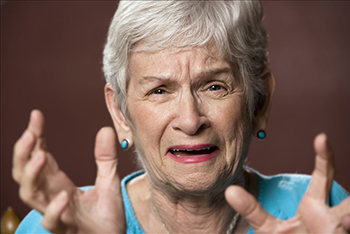(a series in three parts)
Part One | Part Two | Part Three
Simple, Binary Choices

Dr. Tim Tyson
I was raised in a well-meaning, ultra-conservative, extreme fundamentalist church. I was educated in well-meaning, ultra-conservative, extreme fundamentalist schools. My parents and extended family dearly loved me. The people who surrounded me were all kind and loving to those whom they understood: those who also embraced their narrow, chosen lifestyle. And while my early life was initially surrounded by tales of Jesus’ love, I was soon to be taught of a dark side, a God of wrath, jealousy and damnation, a lake of fire, demons, Lucifer, wolves in sheep’s clothing–a hidden enemy within. This dark side was, naturally, to be feared.
There was light. There was darkness. One seemed unable to exist without the other. Binary choices abounded, and choices had to be made. There was love, and there was fear. The fear seemed inseparable from the love and was always used to drive us, as children and adults, to a carefully prescribed narrow way of living, a lifestyle if you will, referred to as righteousness. Sin was not living the righteous lifestyle carefully delineated by the specific teachings of the church and the schools. Those teachings dwelled on the fact that we are all sinners. Sin (evil, darkness–all the same thing) was to be feared.
The two colliding forces of fear and love were neatly tied together with a clever mantra, “Love the sinner. Hate the sin.” And there you have it: fear and sin are inseparable and give birth to hate. And where there is fear, sin, and hate, there is a “good” reason to commit any form of subjugation required.
The list of sins was clearly defined and included the usual suspects (though this seems very bizarre to people who didn’t grow up in this extreme view of reality): going to the movies, listening to rock music, sex (outside of marriage), drugs, long hair on men and short skirts on women… blah, blah, blah. Naturally, to avoid offending those who gave the church money, sins like obesity, materialism, greed, selfishness and the like were rarely mentioned. But one sin was worse than all others. It was so evil, so vile, no one in my youth ever called it by name. Instead, effeminate gestures and a high voice were used to signify the unspeakable. One of my high school teachers even referred to “it” as “moral perversion of the worst kind.” Homosexuality. There, I said “it.”
Homosexuality posed several interesting dilemmas. I’ve already alluded to one of them: “Love the sinner. Hate the sin.” If a person is, as decades of medical literature repeatedly says, born gay, it’s just not possible to hate “the gay” without hating “the person” because the person is in fact inseparable from the gay. The gay and the person are one and the same. To me, this homophobic “hating the sin but loving the sinner” way of thinking about gay people is as absurd as a racist saying s/he loves the black man but hates the black. Huh?!
To remedy this conundrum, the fear monger must conclude that being gay is, without any doubt, a lifestyle choice. Ask Michelle Bachman’s husband, Marcus, who takes a lot of money from the government to supposedly help gay people somehow become straight. [Sources include: LATimes – Bachmann’s Had Her Share of Government Aid and ABC – Michele Bachmann Clinic: Where You Can Pray Away the Gay?] To justify this effort, a scant body of bogus “research” has been fabricated by the likes of psychologist and ordained Southern Baptist minister George Rekers who, for a hefty fee, testified in trials as an expert witness, at least until he was caught with a male escort from RentBoy.com. [Sources include: CBS – George Rekers, Christian Right Leader, Denies Gay Prostitution Allegation; Sources on reparative therapy include: The American Psychological Association’s Resolution on Appropriate Therapeutic Responses to Sexual Orientation]

Southern Baptist minister George Rekers
with Rentboy.com escort “Lucien”
he hired to “help with the luggage”
on a vacation in 2010
As the themes of hypocrisy and opportunism continue to repeatedly play out year after year with different political and religious characters, I am filled with questions. Why can’t love just be enough? Why is fear-based subjugation and the white-washed hatred it always spawns necessary? Does humanity really require fear and hatred for us to be our best selves, to reach our highest potential, to attain the greatest good of which we are capable, to create beauty in all the many forms it can take, to live respectfully and peacefully together?
If salvation is truly a metamorphosis of being, a rebirth, a complete transformation from the inside out, a reaching of one’s highest and fullest potential, is it more likely to be born of love or of fear? Both? My religious upbringing taught me time and time again that people respond to fear, not to love. Fear was at the root of the salvation experience.
Fear incentivized living “righteously.”
Rethinking Binary Choices
Ironically, over 30 years ago now, a gay atheist was to start me on a vastly more substantive, life-long journey in my pursuit of truth. Fortunately, narrow religious fundamentalism didn’t destroy my desire to know truth.
Over the course of two summers, P.K., the atheist’s name, and I had many long, thought-provoking conversations. For the first time, I began to understand that my faith journey could actually welcome my mind as well as my heart–faith in no way forbids me from thinking critically, and thinking for myself. We all see the world around us through a perceptual grid, a perspective of prior knowledge and experiences. P.K. suggested to me that my perspective, my perceptual grid was heavily influenced by the way I was taught to think, and I was taught to see the world only in very religious terms. P.K. was incredibly kind. He didn’t call out the extremist, radical, judgmental nature of my life-long, fear-based training. He allowed me to find that on my own.
Our conversations were long and philosophical. He suggested that there are at least two ways to see the world, to make sense of it and find meaningfulness in life: by seeing how everything in the world is related to everything else, or by always trying to find how each thing in the world is different from every other thing. In other words, where do we want to spend most of our life energy: trying to understand our world by embracing similarities and accepting differences, or do we want to live our lives focused on the things that separate us from others–that make us and “them” different? The latter serves as a wedge that drives people apart. The former brings us together in community.
I was stunned. This was an astounding thought to me at the time. The fundamentalism in which I was raised literally has a “doctrine of separation.” The focus of that entire mindset is on difference: separating from sin (differences not to be tolerated because the religious leadership said so), remaining in the world but not “of” the world, being persecuted because you didn’t “conform” to those around you (the evil world). Fundamentalists focus on how everything is different from everything else. This practice makes isolation, compartmentalization, control and condemnation much easier.
I was always taught that bad things happened to people who did bad things–who sinned. Good things happened to those who “love the Lord” (go by the rules– there is this whole double language thing). The fundamentalist mindset is deeply rooted in exclusion. Everyone has a simple binary lifestyle choice to make. One of the significant problems with this thinking was that it also excluded me from helping real people with real problems in the real world because I was trained to be so horrendously condescending.
Looking Back
I look back at my twenties and early thirties with painful disappointment. My metamorphosis was only barely beginning. I recall a poor, elderly woman sitting in my office weeping. Through her sobs she was trying to tell me about the heartache she lived every day not knowing how to help her granddaughter who I was suspending from school for being involved with illegal drugs. She explained that her granddaughter had witnessed her mother, in prison at the time, shoot and kill her father. Her granddaughter lived a life of hatred, rage, and escape. She would sneak out of the house at night while her grandmother worried for her very life. This poor woman was begging me not to suspend her granddaughter because she was so worried about what she would get herself into while roaming the streets.
Because of the judgmental condescension I had mastered as a result of my fundamentalist thinking habits, I literally thought this heartbroken lady was making this all up in a ploy to get her granddaughter out of trouble! I had mastered the fundamentalists’ art of dismissive condemnation. It goes something like this: bad things only happen to those who make bad choices and therefore get what they deserve. The only solution is repentance (compliance–turning from those wicked ways), and the best way to get repentance is with punishment.
There you have it, a religious dogma that calls for nothing from me other than not do bad things, stay away from those who do bad things, and give money to those who do good things. All I have to do is live a righteous life (as the church leadership defines it), judge those who don’t, and then dismiss myself from any other responsibilities to actually help them. After all, the sinner is the one responsible for his or her own repentance, not those of us living in the bounteous rewards of “righteousness.”
I did nothing that day to ease the suffering of this poor soul, nothing but call 911 when she had a heart attack there in my office. When the paramedics took her away, I began to realize that she had in fact been baring her soul to me. She wasn’t making anything up. Her suffering was real and was deep. She needed compassion, caring, and support–not my turning a deaf ear and then blindly adhering to a “policy-compliant,” “righteous” course of action that would do absolutely nothing to truly grapple with and begin to address the very real problems that had been presented to me. I had been an arrogant fool.
About the author:
Tim Tyson graduated from Bob Jones University in 1979 (B.S.) and again in 1981 (M.A.). He went on to earn his doctoral degree from the University of Illinois. He then had to earn an additional master’s degree from the U of I because BJU is unaccredited and his undergraduate and master’s degrees were not recognized by state teacher certification agencies without a master’s degree from an accredited institution. He lives in Sausalito, CA, with his husband, Steve.


3 comments
this made me cry… Thank you.
Thanks Tim, I too grew up exactly as you did. This is a real eye openier into why my family and I havent spoken in many many years.
Rick, then part three of this series is especially for you!